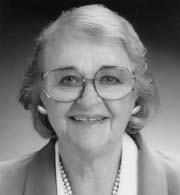Rosalie Silber Abrams
1916-2009

Rosalie Silber Abrams contributed countless hours to achieve equality for women, the older population, and people living with mental illness and developmental disabilities. She was a trailblazer for women in politics, and her work in the field of healthcare dominated all of her professional experiences on both the state and national levels.
Born in Baltimore on June 16, 1916, Abrams lived in Maryland her whole life. She was the third of eight children born to Isaac and Dora Silber, who owned Silber's Bakery, one of Maryland's most prestigious business names. Abrams worked there as a manager for seven years. From 1938-1946, she worked as a registered nurse and served two years as an ensign in the Navy Nurse Corps during World War II. Abrams brought the valuable insight and knowledge she gained working in the healthcare profession with her into the political arena.
Abrams began her career in politics in 1967, following her election to the Maryland House of Delegates. Four years later, she was elected to the Maryland State Senate, where she served for 14 years and was the majority leader, the first woman and Jewish person to hold that position. She was also the first woman in Maryland to hold the position of Senate Finance Committee chair, and the first woman chair of the Maryland Democratic Party.
Abrams authored the legislation that created Maryland's Health Services Cost Review Commission, providing a national model for healthcare reform and cost containment. This Commission, which acts as the rate-setting group for all hospitals in the state, was responsible for keeping Maryland's hospital fees among the lowest in the nation, a role it continues to do. One of the Commission's accomplishments resulted in the all-payer system for hospitals, which ensures that no citizen of or visitor to Maryland can be refused hospital treatment.
Her contributions to women were numerous. In 1980, she pushed through legislation providing for payment of doctor and hospital charges for rape and sexual offense victims. Abrams served as a member of the Commission to Study the Equal Rights Amendment and the Maryland Commission for Women. Abrams was widely known for her contributions to the mental health community and served as Chairperson for the Humane Practices Commission for many years. She also served as the first Chairperson of the Article 59 Committee, which oversaw and revised the mental health laws of the State of Maryland.
Governor Harry Hughes appointed Abrams the Director of the Office on Aging in 1983. There, she assisted both the government and the public in preparing for the emergence of this issue in our society until her retirement in 1996. Abrams published numerous articles for and on older Americans and greatly enhanced healthcare attitudes and policies in Maryland. In 1992, she worked to pass the Health Care Decision Act, which gave patients more control over their treatment during the last few days or weeks of their lives.
Her later years were spent enjoying retirement, attending performances including ballets and operas, and spending time with her friends and family. She died at age 92 from congestive heart failure at Gilchrist Hospice Care in Towson, MD, on February 27, 2009.
Senator Abrams' career as a nurse, statesperson, and the Director of the Maryland Office on Aging, illustrated her endeavors to improve every facet of a Maryland resident's life.
"My first year in the House of Delegates, one of the men said to me, 'You know, when you get up to speak, we forget you are a woman." - Rosalie S. Abrams, quoted by The Baltimore Sun (2009)
Biography courtesy of the Maryland Commission for Women, 1994; updated 2023.
